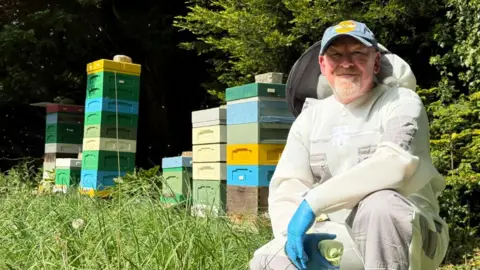Beehives installed at 17th Century walled garden
 BBC
BBCA new collection of beehives has been installed at a 17th Century walled garden to celebrate World Bee Day.
The installation at County Durham's Auckland Palace features three hives and forms part of a wider network buzzing across Bishop Auckland, including several at nearby Binchester Roman Fort.
By the end of summer, the total number of hives will house an estimated 540,000 bees.
A spokesperson said it was "so important" given the crucial role bees play in biodiversity that they are given somewhere to help pollinate crops and plants amid declining habitat numbers.
Behind the new apiary is the Auckland Project, a regeneration charity working to establish Bishop Auckland as a must-visit cultural destination.
"The installation of beehives in our walled garden is symbolic," said Andy Nesbitt, the project's head curator of parks, gardens and landscapes.
"Their presence is a sign of a healthy, thriving ecosystem, and we're proud to create spaces where both people and pollinators can flourish."
David Land, its interim chief executive, added: "We're not just restoring buildings and landscapes - we're restoring life.
"These bees are part of a much bigger vision to connect past, present and future through sustainability, education and storytelling."

Beekeeper Ashley Galley, who is based at Binchester, described the project as continuing a rich centuries-old reverence for the insects, with the Romans even having named the goddess Mellona after them.
"Bees are essential to life as we know it, pollinating one-third of the world's food supply and playing a vital role in the health of entire ecosystems," he said.
Mr Galley said the work being done by the bees at Binchester - once one of the largest Roman military sites in northern Britain - was "staggering".
"To make just one kilogram of honey, a hive collectively flies around 90,000 miles - that's the equivalent of three times around the Earth," he said.
